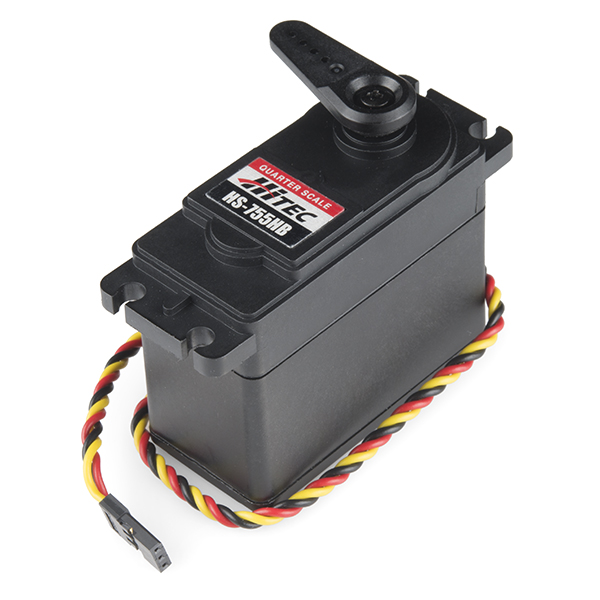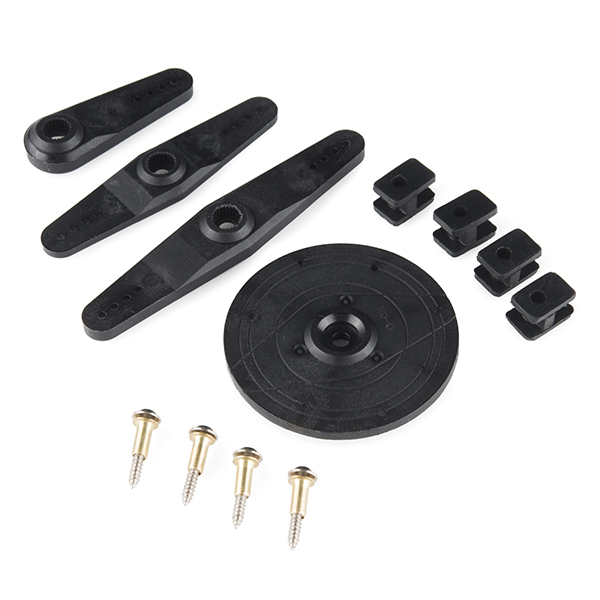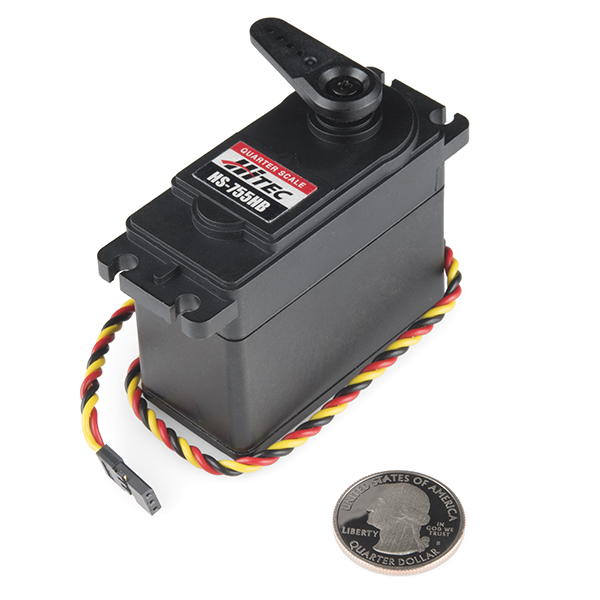Servo - Hitec HS-755HB (1/4 Scale)
This powerhouse is the Hitec HS-755HB servo. Able to take in 6 volts and deliver an impressive 183 oz-in. of maximum torque at 0.23 sec/60°, this is a tough 1/4 scale servo and it won't let you down when you need it!
This high quality servo is perfect for your mechatronic needs and if you are looking to get into robotics, this is where to start. The HS-755HB servo comes standard with a 3-pin gold plated power and control cable and all hardware listed below.
- 1x HS-755HB Servo
- 1x Circle Mega Horn
- 2x Double Arm Mega Horn
- 2x Single Arm Mega Horn
- 4x Rubber Grommets
- 4x 2x15mm Phillips Screw
- 4x Brass Eyelets
- Voltage: 4.8-6.0 Volts
- Torque: 153/183 oz-in. (4.8/6.0V)
- Speed: 0.28/0.23 sec/60° (4.8/6.0V)
- Direction: Clockwise/ Pulse Traveling 1500-1900usec
- Rotation: 180°
- 1 Ball Bearing and 1 Oilite Bushing
- Karbonite Gears
- 3-Pole Ferrite Motor
- C1 Standard Spline* 59 x 29 x 50mm
- Wire Length: 300mm
- Weight: 110g
Servo - Hitec HS-755HB (1/4 Scale) Product Help and Resources
Servo Trigger Hookup Guide
March 26, 2015
How to use the SparkFun Servo Trigger to control a vast array of Servo Motors, without any programming!
Hobby Servo Tutorial
May 26, 2016
Servos are motors that allow you to accurately control the rotation of the output shaft, opening up all kinds of possibilities for robotics and other projects.
Core Skill: Robotics
This skill concerns mechanical and robotics knowledge. You may need to know how mechanical parts interact, how motors work, or how to use motor drivers and controllers.
Skill Level: Competent - You may need an understanding of servo motors and how to drive them. Additionally, you may need some fundamental understanding of motor controllers.
See all skill levels
Core Skill: DIY
Whether it's for assembling a kit, hacking an enclosure, or creating your own parts; the DIY skill is all about knowing how to use tools and the techniques associated with them.
Skill Level: Noob - Basic assembly is required. You may need to provide your own basic tools like a screwdriver, hammer or scissors. Power tools or custom parts are not required. Instructions will be included and easy to follow. Sewing may be required, but only with included patterns.
See all skill levels
Core Skill: Electrical Prototyping
If it requires power, you need to know how much, what all the pins do, and how to hook it up. You may need to reference datasheets, schematics, and know the ins and outs of electronics.
Skill Level: Competent - You will be required to reference a datasheet or schematic to know how to use a component. Your knowledge of a datasheet will only require basic features like power requirements, pinouts, or communications type. Also, you may need a power supply that?s greater than 12V or more than 1A worth of current.
See all skill levels
Comments
Looking for answers to technical questions?
We welcome your comments and suggestions below. However, if you are looking for solutions to technical questions please see our Technical Assistance page.
Customer Reviews
No reviews yet.



